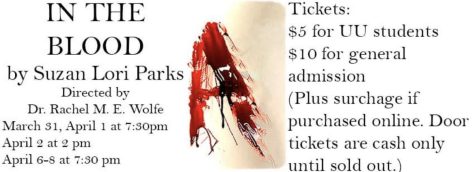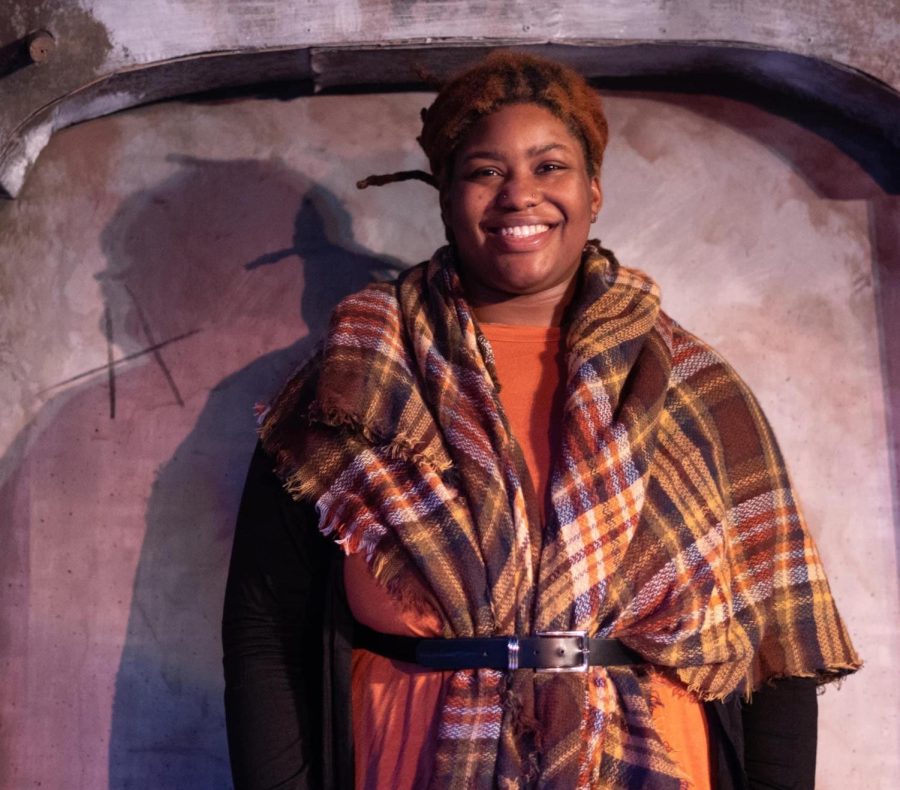“In The Blood” review: Anger, sadness and love
Lead actress Voertje Prather in costume as Hester. Photo courtesy of the Utica University Theatre’s Facebook page.
April 3, 2023
The stage of Strebel Theater depicts an urban scene built up of a wall with a reference to the bible graffitied on it, a sloped platform with a stone-textured wall and a pile of metal to represent a door. Papers, a jug of water and many other miscellaneous items are scattered throughout to give the impression that the audience is peering into someone’s home.
The audience is staring into the personal world of Hester la Negrita, an impoverished Black woman living underneath a bridge with her five children: Jabber, Bully, Beauty, Trouble and Baby.
The play “In The Blood” by playwright Suzan-Lori Parks explores Hester’s life with her children and the five adults that exploit her: Chilli, Welfare, Amiga Gringa, Doctor and Reverend D. The children and adults are double-cast.
This play is a modern adaptation of the Nathaniel Hawthorne novel “The Scarlet Letter,” and touches on very intense yet important themes of motherhood, sexual assault, poverty and oppression.

I went to see the show on opening night, March 31 at 7:30 p.m., with a group of friends. I had read the play in the past for a class, so I was already aware of the content and plot.
Even knowing the plot and having spent hours staring at the script, I was genuinely surprised by how much I enjoyed the production.
Granted, after seeing the cast list come out months ago, I had expected to enjoy it–but the magnitude of which this rendition of the play, which was directed by Rachel Wolfe, has been repeating in my brain was not something I expected.
The cast worked very well together and used the double-casting to their advantage. One of the friends I went to see the show with did not realize that the adults were double-cast, namely Bully and Welfare.
Tori Rentas, a freshman health science major, stunned in her debut performance. Her ability to play the rambunctious and loud Bully in one scene and transition to the cold, judgemental caseworker of Welfare was very impressive. Her voice pitch changed to suit the character and the body language she employed differentiated the characters spectacularly.
The story revolves around Hester and needs a very strong actress to get the rollercoaster of emotions and overwhelming struggles through to the audience. This rendition of the play exceeded expectations with Voertje Prather taking the helm as the main character.
Prather, who has been in many productions prior to coming to Utica and debuting in Strebel Theater during “Trifles” of Fall 2021, was able to embody the raw sadness, anger and love of Hester.
The scenes with Hester and her children in the first act are very heartwarming. Prather’s delivery on lines like “my treasures” and the warm expressions on her face were very motherly. Later in the play, during a heartwarming scene between Hester and her first love Chilli, I could not help but smile at Prather’s expression of joy.
However, this is a very raw and real play, and the joyful scenes did not last long. Prather switched between emanating love to exuding anger and sadness in a matter of a few lines. Her voice went from soft to sharp, her body language relaxed to tense and her face from smiling to tear-covered.
The acting and cast of the play brought the script to life in a way that made me laugh, smile, feel my heart sink and cry in the span of two hours. I have not experienced a play doing that before, and I am so glad this was the first time I did.
I felt the set was very simple, but effective. The props were very fitting, especially the use of a shopping cart with “Jesus” written on it and a boombox to play the tapes. I liked how the slope was used during scenes with the children and Amiga Gringa sliding down it for dramatic effect.
The sound design of the play was very intriguing to me. In between scenes, music by Lil Moe J would play through the speakers. I enjoyed the use of music, especially since this music was created by a Utica alum.
The confessional scenes, which occurred after key scenes in the play and spotlighted the five adults individually, were set up in a way where the focal point is on the person speaking.
The use of spotlights and the projector in the theater to illuminate the name and title of the confession was very effective. I did feel like the music used beneath the confessions, piano music and the occasional slip of a rap song while transitioning, felt a little jarring at times because it was not always a seamless transition.
I also think that for some of the monologues, the audience had a difficult time understanding when they were over. The lights would dim red and the characters would back away from their initial standing point, but the dimmed lights would not always occur at the end of the confession. The delivery on some of the monologues also lacked a sense of finality and the audience, including me, couldn’t tell when to clap.
The themes of the play were very clear in this production, but I felt that something was missing from the staging of the end. Without giving any spoilers, I felt that the staging of the ending was too simple for such a tumultuous and heartbreaking display; due to the nature of the ending of the play, I think having a more overt use of sound effects and visual effects would have amplified the feeling of sadness and anger the ending evokes.
Overall, I felt that the cast, crew and director succeeded in telling a story rooted in the real, horrific truths of oppression and what comes with it. The acting, set pieces, sound design and lighting design create a very compelling story that forces the audience to recognize their role as a spectator while the family on stage suffers.
It is very powerful, it is very painful and it is something I would strongly recommend you see before it ends.
There are three more showings this upcoming week April 6-8 at 7:30 p.m. Cost for attendance is $10 for community members and $5 for students. Tickets can be purchased using cash at the doors or online, with a surcharge, on Eventbrite.





































































































































